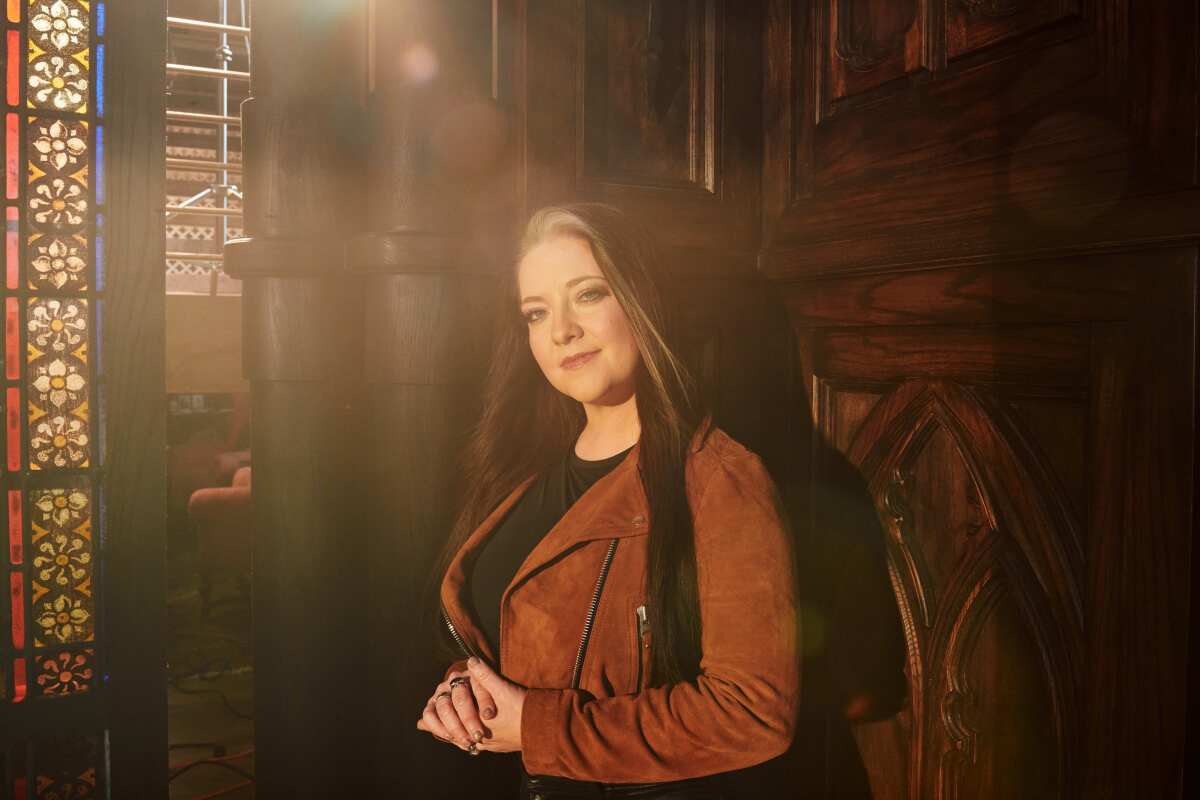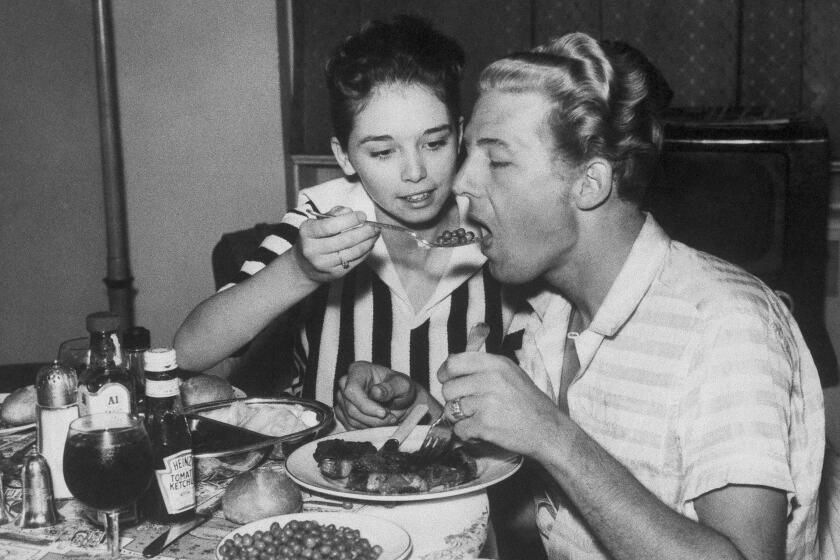By bucking norms, Ashley McBryde became one of country’s most respected, and unlikeliest, stars

- Share via
NASHVILLE — If things ever go sideways in her career as a country singer, Ashley McBryde has a solid backup plan in place: a reality series starring her and Martina McBride, the veteran country star so frequently mistaken as a relative that McBryde owns a website — isashleymcbryderelatedtomartinamcbride.com — whose only purpose is to serve up Merriam-Webster’s definition of “no.”
The show would be called “McBridesmaids,” its premise simple yet rich with potential. “We’d just go around and crash people’s weddings,” McBryde says with a chesty laugh. “Then at the end of each episode, the two of us would join the wedding band and jam.”
You can already envision the high jinks. Alas, given the roll McBryde’s been on, “McBridesmaids” is unlikely to reach Bravo anytime soon. One of Nashville’s most emotionally incisive songwriters — with a voice that can channel pain as vividly as defiance — McBryde, 39, performed this fall as a special guest on the Judds’ tour commemorating the life of Naomi Judd, who died in April. McBryde’s acclaimed new album, “Lindeville,” is expected to earn a Grammy nomination or two. And she’s up for five prizes at Wednesday night’s Country Music Assn. Awards, including female vocalist of the year and song of the year with “Never Wanted to Be That Girl,” her chart-topping duet with Carly Pearce.

Add to that the invitation she received last month — from Garth Brooks, no less — to join the venerable Grand Ole Opry, “which are words I’ve literally worked my entire life to hear,” says McBryde, who grew up in rural Arkansas and made her bones playing bars in Memphis before she moved to country music’s capital in 2006. “People were texting me asking me how I was gonna celebrate. I was like, ‘I’m getting on a plane to go sing with Wynonna Judd.’” She laughs again. “How is this real life?”
Says Judd, who selected McBryde (along with Brandi Carlile, Trisha Yearwood and the other McBridesmaid) to go on the road in honor of her late mother and bandmate: “I just think she’s a bada—. If I hadn’t come up with my mom, I probably would’ve been just as rambunctious and have as many tattoos as Ashley does.” Judd recalls telling McBryde, after a few tour dates together, that she wanted them to do her song “Rock Bottom.”
“She didn’t know the verse, so I said, ‘Well, you better go back to your bus and learn it if you’re gonna work with me, Miss Sassy Britches,’” Judd says. “The next night she walked out onstage and took over my song like she was stealing my food.”
Morris, who sparred with Jason and Brittany Aldean over their transphobic social media posts, says that country music is fractured, and that’s not a bad thing.
McBryde admits that all the action has been exhausting. “We started glam [hair and makeup] at 4:30 this morning,” she says over late-afternoon beers, curled on a sofa at her manager’s office in Nashville. She’s already done a TV spot and a photo shoot today, and tonight she’ll play at the Opry before catching an early flight to make a corporate gig for Southwest Airlines. “But again, this is what I’ve been working for.” She takes a swig. “Wearing out beats going to rust.”

For many country stars in McBryde’s position, this would be a moment to consolidate their success in a slow-moving industry that prizes consistency and reliability. Yet with “Lindeville,” her third major-label LP, the singer takes an unexpected left turn: Titled as a nod to Dennis Linde, the Nashville songwriter known for tunes like the Chicks’ “Goodbye Earl” and Joe Diffie’s “John Deere Green,” “Lindeville” is a quirky concept album full of interconnected songs about the residents of a small town — folks like Brenda, who watches with glee as a neighbor comes home to find her baby daddy in bed with the babysitter, and Patti, a stripper who pops “an upper to get through her shift and a downer so she can lay down with the kids.”
The music pulls from folk and bluegrass and West Coast country-rock, and McBryde doesn’t even sing lead on most of the tracks; instead she hands the mic to pals such as Brandy Clark and T.J. Osborne of Brothers Osborne, the latter of whom delivers a killer ballad about an aging vet who “lost his wife to cancer and a thumb in Vietnam/ Jokes he used to be a hitchhiker but not for very long.” Between some of the songs, fake radio jingles for imagined Lindeville businesses — Dandelion Diner, for instance, where “it’s high time for pie time” — give the whole thing a kind of “Prairie Home Companion” vibe.
Jerry Lee Lewis’ marriage to his 13-year-old cousin in 1957 nearly ended his career. Today, Myra Williams, 78, reflects on the scandal and her late ex-husband.
Brothers Osborne’s John Osborne, who produced the LP, says “Lindeville” feels to him “like a sixth or seventh album from an established artist who wants to pursue something risky and creative.” That McBryde wanted to make a record like this relatively early “just tells you how fearless she is,” says Osborne, though it also reflects the unique circumstances brought on by COVID-19: Forced off the road for most of 2020, McBryde and Clark holed up with several other songwriters in a cabin in October of that year and spent a week writing with “complete freedom,” as McBryde puts it, unburdened by thoughts of radio play or how the songs might fit on a set list next to older McBryde hits like “One Night Standards” and “A Little Dive Bar in Dahlonega.”
“We weren’t worried about what it was for,” she says of the music. “We just had to love it.”
Beyond its debt to Linde, the result showcases a songwriting craft — and a sense of empathy — clearly influenced by John Prine, to whom McBryde grew close before his death in 2020. “Ashley sees everything,” John Osborne says. “She’s just so well versed in the human condition.” And yet you can view the intricate character studies on “Lindeville” as a very private woman’s way to deflect fans’ interest in her personal life. McBryde generally avoids talking about relationships and her family, which she says she does “in the interest of protecting my loved ones. I’m not the biggest star there ever was, but they get bothered. And that’s not something they signed up for.”

Which isn’t to say that McBryde’s music lacks specific emotional scars — far from it. One of “Lindeville’s” highlights is “Gospel Night at the Strip Club,” a sparse acoustic number that alternates detailed verses about a club’s various habitués with a moving chorus that goes, “Jesus loves the drunkards and the whores and the queers.” In interviews, McBryde has said she knew the lyric would get her into some trouble. Asked to specify with whom, she says, “I was raised in the Church of Christ, and there are definitely members of my family that would disagree with that sentence. But I’m sitting in front of you because that’s not true. He absolutely loves the strays even more than he loves the museums full of good people that we think are a thing.”
McBryde says she began playing bars when she was 19. “And I traveled alone — 60,000 miles a year in my truck with my dog and my own PA,” she adds. “Nothing will reshape your belief system like that. ‘No one hangs out in bars except bad people.’ Actually, no, it’s super-open-minded people whose goal is just to be in the same place as other people trying to find joy.”

Singing affirmatively about queer people — on an album featuring two openly gay country acts in Clark and T.J. Osborne — has also thrust McBryde into the culture war raging in Nashville over how inclusive the genre is or should be. She refers to the feud between Maren Morris and Jason Aldean, in which the two stars have traded barbs over issues related to trans youth, as “a disaster,” though she’s initially reluctant to make any prescriptions for the country industry.
“I think Nashville had such an idea about what I should be that now I don’t give a f— what Nashville should be,” she says, explaining that when she got to town, she was advised to lose weight and to dye her hair blond to match a stereotype her success has helped dismantle. “I tend to lean more inclusive, but I don’t really draw a lot of hard lines, especially in public. If you don’t like tattoos, don’t get one. If you’re against gay marriage, don’t marry a gay person. But can’t we just not be a—holes?”
She thinks for a moment. “Country music has always striven to appear as a nice person,” she says. “But I would love to see us be a good person.”
More to Read
The biggest entertainment stories
Get our big stories about Hollywood, film, television, music, arts, culture and more right in your inbox as soon as they publish.
You may occasionally receive promotional content from the Los Angeles Times.













